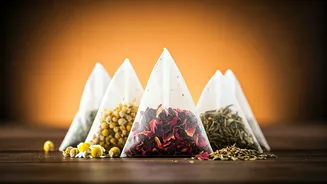Tea for Hearts
Herbal teas offer a delightful approach to heart health, with several varieties demonstrating potential benefits for managing cholesterol levels. These
teas have been used for centuries across different cultures. In today's world, scientific research is also uncovering evidence about their efficacy. Many herbal teas contain compounds that may help reduce LDL cholesterol (often referred to as 'bad' cholesterol), improve blood vessel function, and offer antioxidant properties. By incorporating these teas into your diet, it might be possible to naturally support your cardiovascular system. However, it's essential to remember that herbal teas should be part of a balanced diet and healthy lifestyle, not a standalone solution. Before starting any new herbal regimen, particularly if you have existing health conditions or are taking medication, it’s best to consult a healthcare professional.
Hawthorn Berry Tea
Hawthorn berry tea is a well-regarded herbal tea that has a strong reputation for promoting heart health. Hawthorn berries, the fruits of the hawthorn shrub, are rich in flavonoids, which act as powerful antioxidants. These antioxidants can protect the heart from damage caused by free radicals. Research indicates that hawthorn can help dilate blood vessels, thereby improving blood flow and reducing blood pressure. It may also help improve the heart's pumping strength. To prepare hawthorn berry tea, you can steep dried hawthorn berries in hot water for about 10–15 minutes. It can be consumed daily. People generally tolerate it well, but it might interact with certain heart medications, so consulting a doctor before consumption is important.
Hibiscus Tea's Perks
Hibiscus tea, known for its vibrant red color and tart flavor, is another beneficial option for heart health. Hibiscus is packed with antioxidants, especially anthocyanins, which not only provide its color but also offer protective effects against cardiovascular diseases. Studies have shown that hibiscus tea can help lower both systolic and diastolic blood pressure levels. Drinking hibiscus tea regularly can also help to reduce LDL cholesterol and triglycerides, contributing to a healthier lipid profile. Preparing hibiscus tea involves steeping dried hibiscus flowers in hot water for approximately 5–10 minutes. The resulting tea is delicious served warm or cold. It's also worth noting that it can affect blood sugar levels, which is a good reason to speak with your doctor beforehand, particularly if you have diabetes or are on any medications.
Green Tea's Strength
Green tea, a beverage enjoyed worldwide, is renowned for its numerous health benefits, including supporting heart health. Green tea contains catechins, a type of antioxidant that protects the heart by reducing inflammation and preventing oxidative stress. Regular consumption of green tea has been associated with improved cholesterol levels, specifically a reduction in LDL cholesterol and an increase in HDL cholesterol (the 'good' cholesterol). Additionally, it may help improve blood vessel function and lower blood pressure. To enjoy the advantages of green tea, brew green tea leaves in hot water (around 170–180°F or 77–82°C) for a few minutes. Over-steeping can make the tea bitter. It is advisable to limit your caffeine intake if you are sensitive to it, and consider avoiding it if you have certain heart conditions or are taking blood thinners without consulting your doctor.
Artichoke Leaf Tea
Artichoke leaf tea provides a natural way to support cardiovascular wellness, thanks to its specific compounds. These include cynarin, which can help in reducing cholesterol levels by inhibiting its production in the liver. Artichoke leaf extract has been shown to reduce both total cholesterol and LDL cholesterol levels. Additionally, it possesses antioxidant and anti-inflammatory properties, providing additional cardiovascular benefits. The tea is prepared by steeping dried artichoke leaves in hot water. While artichoke leaf tea is generally considered safe, some people may experience digestive issues, like bloating or gas. People should consult their doctor, particularly if they are taking any medications, before incorporating it into their routine.























